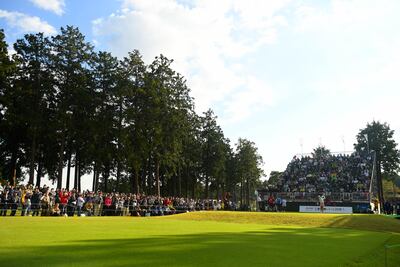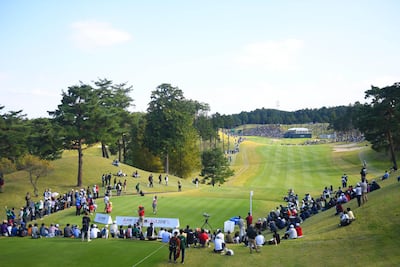Developers in cities across the US are rushing to cash in on the closure of thousands of golf clubs amid heated public debates about what should be done with such large green spaces, analysts and local campaigners say.
This golf course "gold rush" accelerated due to a glut of new facilities opening between 1998 and 2006 and waning interest in golf among millennials.
The closures gathered momentum after the economic recession of 2008, according to the Urban Land Institute, a think tank.
"We've seen a pretty significant decline in the number of golf courses, both because of oversupply and under-demand," said Ed McMahon, a senior resident fellow at the institute.
"Many golf courses were built for purposes other than to make money – to sell houses and fill up hotels. But millennials are not nearly as interested in golf," he said.
Often situated on valuable urban land, the golf course owners see selling or redeveloping the land as an exit strategy for unprofitable businesses.
"You could call it a golf course gold rush: as courses fail, it's a big-money opportunity for developers," said Steve Seroka, a member of the Las Vegas city council.
About 205 US golf courses closed last year, reducing the total to about 14,800, according to the National Golf Foundation (NGF).
The closures are a result of "a continued correction in supply and demand ... after an unsustainable 20-year period of growth in which the US golf market added more than 4,000 new facilities and increased overall supply by 44 per cent," the NGF said.
Las Vegas has an "overabundance" of golf courses, Mr Seroka said, several of which have either closed or are in financial troubles.
The city is in a valley surrounded by mountains, and as development has spread out, "it's getting hard to find large-acreage parcels," Mr Seroka said. "So these golf courses are becoming very attractive."
But Las Vegas has no rules governing the redevelopment of former golf courses, he noted. "That's what's causing confusion."
Mr Seroka, elected in 2017, said conflicts over golf course redevelopment are what got him to run for office: specifically, a course that had closed down in the centre of a planned community where a developer wanted to put 3,000 new dwellings.
That case is now tied up in lawsuits.
The majority of closed golf courses is being turned into housing developments, while others are now public parks and a few have become orchards or vineyards, said the Urban Land Institute's McMahon.
That turn towards agriculture is especially prevalent in housing developments purposefully designed around golf courses – and which used that amenity as a key selling point, said McMahon.
_______________
Read more:
New US property boom sees housing for classic cars take off
UK targets London properties of jailed Azeri banker
_______________
"A lot of times, the homeowners come in after the course has been shut down. They say, what do we do here now? We have a desert, and we need to find a solution," said Jon Beckner of Agriburbia.
"We see it as a trend and a solution that can really transition golf into a different experience," said Mr Beckner, whose national consultancy works on converting golf courses in residential developments into farms, gardens and agriculture-based businesses such as breweries.
In Denver, the potential closure of the 155-acre Park Hill Golf Course prompted anger among some who supported the area as open space and did not want to see it developed.
As the lease came up for renewal, the trust that owns the property sought to sell the land to the city and potentially use it to build affordable housing.
"This land is located in a traditional black community in Denver, a community that is going through incredible property value increase - to the extent that people are being priced out," said Charlotte Brantley, president of Clayton Early Learning, which owns the property that the course sits on.
Ms Brantley and her colleagues undertook an extensive process of asking the surrounding neighbourhoods what they would like to see happen with the land, including multiple rounds of community meetings and more.
According to a door-to-door and online survey carried out as part of that process, two-thirds of around 750 respondents had not used the golf facilities in the previous two years, and half supported a different use for the land, Ms Brantley said.
Mr Seroka started looking around the country, gathering insight from other cities where courses had successfully been redeveloped, in states such as Arizona, California, Florida and Texas.
Two basic considerations stand out in all successful redevelopments, he said. First, locals and the developer need to come together for discussion beforehand and clarify points of agreement and disagreement. And second, if such a redevelopment goes forward, it needs to leave a buffer of green space to protect existing communities. Mr Seroka has now put together a proposed package of such guidelines, which are to be heard by the Las Vegas city council this month. He said he is hopeful that passage will make Las Vegas a leader on the issue.
"The places that didn't do this right, the courses are still sitting empty, and there's still a community fight going on," he said.
"The ones who did it right, everyone benefited, and they moved on."




